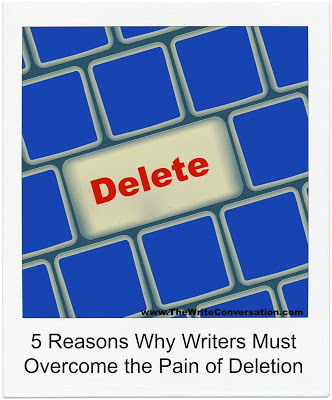5 Reasons Why Writers Must Overcome the Pain of Deletion
by Katy Kauffman @KatyKauffman28
 I get attached to the words I write. Do you?
I get attached to the words I write. Do you?
One of the hardest things about editing books is deleting sentences, paragraphs, and even whole pages.
It’s not easy to string words and ideas together, so why go through the pain of deleting them? Our words are our “babies.”
But the time comes when you have to consider whether every word is vital to a sentence, whether every sentence is needed, and whether every paragraph helps a chapter to be the best it can be.
So maybe I can smooth the inner turmoil a bit.
Here are some reasons why deleting is necessary to make our writing better.
1. Unnecessary words distract from your main point. Don’t let unneeded words distract the reader from the heart of your message. You may like a certain rabbit trail or want to include an extra illustration, but consider whether it will help your point or hinder it. See whether every word is serving a useful purpose. If you can delete a word or sentence and find that you’re not missing something important, it needs to go! Tight writing makes for excellent reading.
 Too many words in a sentence can hurt
Too many words in a sentence can hurt
the musicality of your writing2. Too many words in a sentence can hurt the musicality of your writing.Although it’s good to mix long and short sentences, too many long sentences can sound monotonous in the mind of the reader. You don’t want your sentences to sound burdened and weighed down. Remember that the words you write become a song for your reader to hear, so select words that add lyricism to your writing and delete words that muffle the melody.
3. Your book may need to start on a different page or in a different chapter.Sacrilege, right?! I found that Introductions are the hardest to write. Stay open to the possibility that the best place to start your book may not be on page 1. Since the beginning of a book needs to be as snappy and attention-getting as possible, I’ve found that it may be necessary to delete some paragraphs or pages to jump into the book’s message. Receiving feedback from a writers group or an impartial friend will help you to know whether your book starts at the right spot.
 Your writing is more about what the reader needs to hear
Your writing is more about what the reader needs to hear
rather than what you need to say.4. Your writing is more about what the reader needs to hear rather than what you need to say.Writing is definitely therapy for the soul, but a book shouldn’t be our personal venting platform. God can work through our joys and troubles and speak to others. We just need to know how much to divulge. We can take the lessons we’ve learned and share them with our readers, and perhaps they will reach their own “aha” moment when the truth of God clicks in their minds and hearts. Remembering our purpose in writing—to encourage, strengthen, or instruct—will help us to know what to include and what to leave out.
5. The reader will never know what was deleted. Did that one make you smile? We may agonize over what needs to be left out, but the reader will never know about our agony. Hopefully, what they read will be a heartfelt, prayed-over, edited and re-edited version of what we want to share with them. The published work will have so much love, insight, and wisdom poured into it, that the reader will be blessed. Much more than if they had read our first draft. A book improves with editing, prayer, and even deletion.
So take heart, my writer friend! The words you write are precious, and the words you leave in your book are even more so. They will speak to the reader, play a song in their head, and touch their heart.
When you delete something from your writing, do you find it a burden or a relief? What types of things do you tend to delete more than others? Share your thoughts below, and don’t forget to join the conversation!
TWEETABLESWriters love their words – 5 Reasons to cut what isn’tworking - @KatyKauffman28 (Click to Tweet)
5 Reasons why writers must overcome the pain of deletion – @KatyKauffman28 on @EdieMelson(Click to Tweet)
 Katy Kauffman is an award-winning writer and a co-founder of Lighthouse Bible Studies, a ministry which seeks to connect people to God through His Word.
Katy Kauffman is an award-winning writer and a co-founder of Lighthouse Bible Studies, a ministry which seeks to connect people to God through His Word.
She has taught the Bible to women and teens, and has two published Bible studies for women, 2 Timothy: Winning the Victory and Faith, Courage, and Victory. She is an editor of the new Refresh Bible Study Magazine and the designer of Broken but Priceless: The Magazine. She makes her home near Atlanta, Georgia.
 I get attached to the words I write. Do you?
I get attached to the words I write. Do you?One of the hardest things about editing books is deleting sentences, paragraphs, and even whole pages.
It’s not easy to string words and ideas together, so why go through the pain of deleting them? Our words are our “babies.”
But the time comes when you have to consider whether every word is vital to a sentence, whether every sentence is needed, and whether every paragraph helps a chapter to be the best it can be.
So maybe I can smooth the inner turmoil a bit.
Here are some reasons why deleting is necessary to make our writing better.
1. Unnecessary words distract from your main point. Don’t let unneeded words distract the reader from the heart of your message. You may like a certain rabbit trail or want to include an extra illustration, but consider whether it will help your point or hinder it. See whether every word is serving a useful purpose. If you can delete a word or sentence and find that you’re not missing something important, it needs to go! Tight writing makes for excellent reading.
 Too many words in a sentence can hurt
Too many words in a sentence can hurt the musicality of your writing2. Too many words in a sentence can hurt the musicality of your writing.Although it’s good to mix long and short sentences, too many long sentences can sound monotonous in the mind of the reader. You don’t want your sentences to sound burdened and weighed down. Remember that the words you write become a song for your reader to hear, so select words that add lyricism to your writing and delete words that muffle the melody.
3. Your book may need to start on a different page or in a different chapter.Sacrilege, right?! I found that Introductions are the hardest to write. Stay open to the possibility that the best place to start your book may not be on page 1. Since the beginning of a book needs to be as snappy and attention-getting as possible, I’ve found that it may be necessary to delete some paragraphs or pages to jump into the book’s message. Receiving feedback from a writers group or an impartial friend will help you to know whether your book starts at the right spot.
 Your writing is more about what the reader needs to hear
Your writing is more about what the reader needs to hearrather than what you need to say.4. Your writing is more about what the reader needs to hear rather than what you need to say.Writing is definitely therapy for the soul, but a book shouldn’t be our personal venting platform. God can work through our joys and troubles and speak to others. We just need to know how much to divulge. We can take the lessons we’ve learned and share them with our readers, and perhaps they will reach their own “aha” moment when the truth of God clicks in their minds and hearts. Remembering our purpose in writing—to encourage, strengthen, or instruct—will help us to know what to include and what to leave out.
5. The reader will never know what was deleted. Did that one make you smile? We may agonize over what needs to be left out, but the reader will never know about our agony. Hopefully, what they read will be a heartfelt, prayed-over, edited and re-edited version of what we want to share with them. The published work will have so much love, insight, and wisdom poured into it, that the reader will be blessed. Much more than if they had read our first draft. A book improves with editing, prayer, and even deletion.
So take heart, my writer friend! The words you write are precious, and the words you leave in your book are even more so. They will speak to the reader, play a song in their head, and touch their heart.
When you delete something from your writing, do you find it a burden or a relief? What types of things do you tend to delete more than others? Share your thoughts below, and don’t forget to join the conversation!
TWEETABLESWriters love their words – 5 Reasons to cut what isn’tworking - @KatyKauffman28 (Click to Tweet)
5 Reasons why writers must overcome the pain of deletion – @KatyKauffman28 on @EdieMelson(Click to Tweet)
 Katy Kauffman is an award-winning writer and a co-founder of Lighthouse Bible Studies, a ministry which seeks to connect people to God through His Word.
Katy Kauffman is an award-winning writer and a co-founder of Lighthouse Bible Studies, a ministry which seeks to connect people to God through His Word. She has taught the Bible to women and teens, and has two published Bible studies for women, 2 Timothy: Winning the Victory and Faith, Courage, and Victory. She is an editor of the new Refresh Bible Study Magazine and the designer of Broken but Priceless: The Magazine. She makes her home near Atlanta, Georgia.
Published on November 18, 2015 01:00
No comments have been added yet.



